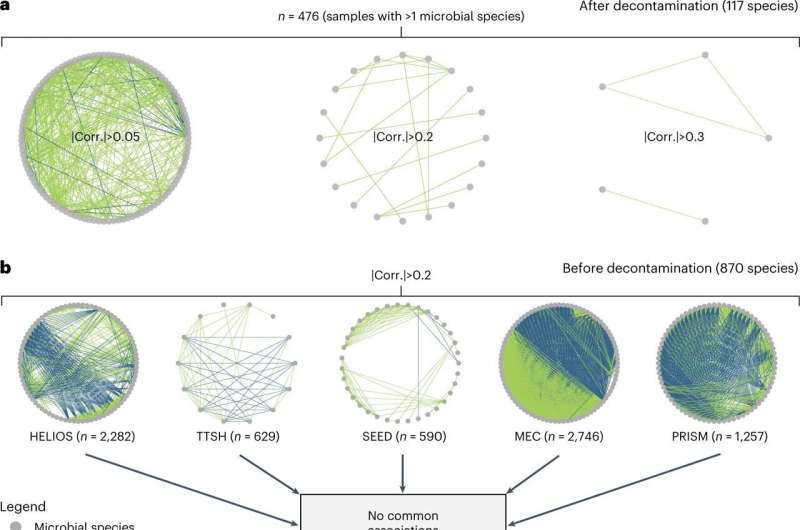This article has been reviewed according to Science X's editorial process and policies. Editors have highlighted the following attributes while ensuring the content's credibility:
fact-checked
peer-reviewed publication
trusted source
proofread
Study finds evidence of no common blood microbes in healthy humans

There is no stable microbial community residing in the bloodstream of healthy humans, according to a new study led by a UCL researcher.
The new Nature Microbiology paper makes an important confirmation as blood donations are a crucial part of medical practice. Understanding what types of microbes may be found in blood may allow the development of better microbial tests in blood donations, which would minimize the risk of transfusion-related infections.
Lead author, Ph.D. student Cedric Tan (UCL Genetics Institute and Francis Crick Institute) said, "Human blood is generally considered sterile. While sometimes microorganisms will enter the bloodstream such as via a wound or after tooth-brushing, mostly this is quickly resolved by the immune system.
"But in recent decades this paradigm has been challenged by speculation that the blood could host a community of microbes. Here, we have confirmed this is not the case, as most people's blood does not contain microbes, and the microbial species found in some people's blood varied substantially between individuals."
For the study, Cedric worked with a team supervised by Dr. Niranjan Nagarajan at A*STAR's Genome Institute of Singapore to analyze the population-scale sequencing data from "SG10K Health," a project of Singapore's National Precision Medicine program.
After accounting for contamination that is rife in microbiome investigations, the team found that microbes were only rarely and sporadically detected in blood, instead of existing as stable communities. Among their sample of 9,770 people, 84% of people did not have any microbes in their blood sample, and less than 5% of people shared the same species.
The scientists also found evidence that some bacteria in the blood of healthy individuals might be replicating and most of these bacteria are typically found in the human gut, oral, or skin microbiomes. Their findings suggest that microbes do occasionally enter the bloodstream from other body sites without causing disease, but there is no core set of species colonizing the blood of healthy individuals.
The findings also provide a useful resource for the types of microbes that one might expect to occasionally see in the blood of healthy humans. Characterizing the range of microbial species present in the blood of healthy individuals forms a crucial baseline for comparison with that of diseased individuals, shedding light on how blood microbial profiles may correlate with health status.
In a research briefing accompanying the study, Cedric wrote, "Our study focuses on healthy individuals but does not preclude the presence of blood microbial communities in patients with chronic diseases such as cancer or diabetes. A logical next step would be to determine if blood-borne communities are present in these cases and if said communities are associated with disease severity and progression. This approach might open new doors for microbiome-based therapeutics of chronic illnesses."
More information: Cedric C. S. Tan et al, No evidence for a common blood microbiome based on a population study of 9,770 healthy humans, Nature Microbiology (2023). DOI: 10.1038/s41564-023-01350-w
No microbial community in the blood of healthy individuals, Nature Microbiology (2023). DOI: 10.1038/s41564-023-01364-4
Journal information: Nature Microbiology
Provided by University College London




















